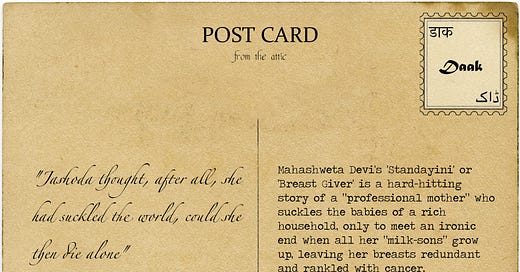Women’s Position in Post-Colonial India: Mahashweta Devi’s Story, Breast-Giver
Mahashweta Devi’s “Standayini” (Breast Giver) is a hard-hitting story of a “professional mother” who suckles the babes of the rich Haldar household only to meet an ironic end when all her “milk-sons” grow up, leaving her breasts redundant and rankled with cancer.
The story recognises several problems with women’s position in a post-colonial India. Women are idolised, almost worshipped — the female protagonist Jashoda (named after the paragon of motherhood, Yashoda) is often referred to as the “Lionseated'' and the “Mother of the world”; other servants in the household wash her feet and drink that water. Once the object of intense lust and desire due to her ample bosom, Jashoda’s profession transforms her into a Goddess overnight. Women like Jashoda also enslave themselves by adhering to this image imposed upon them:
Jashoda is fully an Indian woman, whose unreasonable, unreasoning and unintelligent devotion to her husband and love for her children, whose unnatural renunciation and forgiveness, have been kept alive in the popular consciousness by all Indian women from Sati-Savitri-Sita through Nirupa Roy and Chand Osmani.
It is only at the very end when Jashoda is abused by her husband and neglected by her sons, does she really abandon them, both physically and emotionally. She realises that none of her children, biological or surrogate, will be there for her as she breathes her last.
So, Jashoda, along with other women around her, is first exploited and then rendered useless, at times by men, but surprisingly often by other women; the Mistress of the Haldar household encourages Jashoda to keep bearing children so she can produce milk, the step daughters eventually turn her out, a woman steals her husband and the maids become neglectful and disrespectful towards Jashoda as she comes to terms with her loss of status.
In the end, the festering sores on Jashoda’s cancer-infested breasts drive away her briefly-guilty husband and all her “milk-sons” whom she had helped raise. None of her own daughters or the Haldar daughters in law come to see her. She is left all alone with her confused thoughts and regrets:
Jashoda thought, after all, she had suckled the world, could she then die alone?
“Breast-Giver” is a powerful and provocative read, highlighting the complexity of women’s identities in times of social flux.
You can find a book of her Mahashweta Devi’s short stories including Breast-Giver here.



